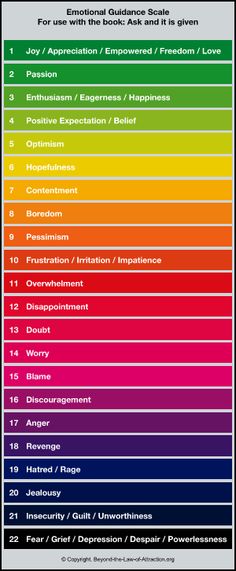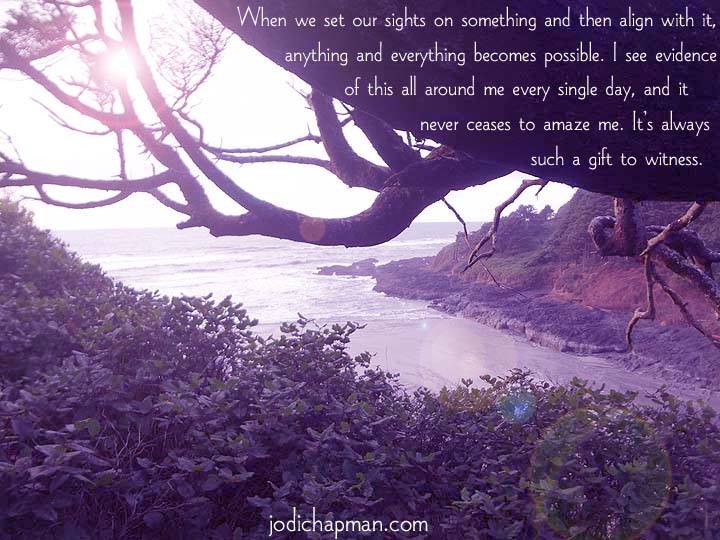 I love surrounding myself with inspiring words. I’ve spent countless hours reading everything from ancient scriptures to blogs and Facebook posts intended to uplift and enlighten.
I love surrounding myself with inspiring words. I’ve spent countless hours reading everything from ancient scriptures to blogs and Facebook posts intended to uplift and enlighten.
While I’m glad to have been exposed to a wide range of teachings, I’ve realized that I could probably live a fairly happy, fulfilling life with just a handful of basic premises, teachings, and quotes.
With this in mind, I recently created a personal “best-of” list of about a dozen such teachings, about half of which came from Abraham-Hicks (who coined the phrase Law of Attraction and teach this concept, which has since been popularized in the movie The Secret and elsewhere). So, in fairness to everyone else, I’ve decided to create two separate lists. (I’ll feature the “Everyone Else” list in my next post.)
If this is your introduction to the Law of Attraction or the Teachings of Abraham, don’t worry if not all of it makes sense right away (especially idiosyncratic phrases such as “contrasts launch rockets of desire”) — just take in what resonates and let go of the rest. (Also, if you’re interested, you can learn more about them through their books, YouTube videos, or their website.)
This is by no means intended to be a comprehensive overview, just a snippet of the parts that resonate the most with me (a sort of “Desert-Island Abraham”) — the 7 teachings that, even if I had nothing else, could form the basis of a very satisfying, rich, joyful personal experience.
So, here they are (in semi-logical/flowing order, rather than ranked by importance):
1. “The basis of your life is freedom, the purpose of your life is joy, and the result of your life is expansion.” — First of all, if we didn’t have freedom, the rest of this post (and all teachings) would be irrelevant. If we didn’t have a choice, then there’s nothing we could do to change our lives — we’d be puppets in the hand of Fate. But we do have a choice! Freedom is at the basis of who we are; we are freedom-seeking beings! (And perhaps the greatest freedom is the freedom to decide what we focus on — what we give our attention and energy to. [More on this later.]) But what would be the point of using of freedom of choice if it just made us miserable? Why are we doing all this choosing, focusing, and freedom-seeking? For the joy of it! And what happens as we do this? Our lives expand, WE expand, and the entire universe expands! Forever.
 2. The Emotional Guidance System/Scale — So, how do you go about choosing what to focus on and how to bring more joy into your life? You let your emotions guide you. Positive emotions give you feedback that you’re in the process of manifesting something you desire (telling you, in effect: “You’re Getting Warmer!“). Negative emotions are also helpful messages, inviting you to shift your focus before you manifest something undesirable. So, ALL emotions are useful because, as Abraham says, they’re your soul’s way of telling you whether or not you’re focusing on what your soul is focused on (or in the same way or on the same aspects). What a wonderful guide for your entire life!
2. The Emotional Guidance System/Scale — So, how do you go about choosing what to focus on and how to bring more joy into your life? You let your emotions guide you. Positive emotions give you feedback that you’re in the process of manifesting something you desire (telling you, in effect: “You’re Getting Warmer!“). Negative emotions are also helpful messages, inviting you to shift your focus before you manifest something undesirable. So, ALL emotions are useful because, as Abraham says, they’re your soul’s way of telling you whether or not you’re focusing on what your soul is focused on (or in the same way or on the same aspects). What a wonderful guide for your entire life!
Another great aspect of this teaching is the Emotional Scale (pictured at right). While you might not have access to an emotion that’s far away from your current state (e.g., trying to jump straight from depression to love), you can usually at least lean toward an emotion that feels even a little bit better (e.g., moving from pessimism to boredom and then to hopefulness). Throughout this process, the key feeling is always RELIEF — you’re looking for a thought, an activity, or a focus that brings you some degree of relief. If you feel relief, you’re pointing in a positive direction. And you can feel this by focusing on a better-feeling thought for as little as 17 seconds!
3. “Everything you want is downstream.” — This is the one that might push the most buttons, as it flies in the face of nearly every message society gives us throughout our lives. To summarize this teaching in non-Abe terms: “Life Was Never Meant to Be a Struggle” (as Stuart Wilde wrote in the title of his popular book). We are designed to go with the flow, rather than fighting the current of life. (Esther and Jerry Hicks learned this lesson firsthand during a whitewater rafting trip, when attempting to paddle upstream would have proven arduous, unpleasant, and utterly futile.) Despite the fact that the world tends to give out trophies (figuratively and sometimes literally) for bucking the current, fighting our natural inclinations, and struggling mightily, the upstream enterprise runs directly counter to our happiness, to our soul, to the universe. As my t’ai chi teacher once told me, “You can either work with the force that creates worlds, moves the tides, and sustains life…or you can fight it.” Although it might not sound as heroic as “fighting the good fight,” Abraham encourages downstream living, and so do I.
4. The 3 Steps of Manifestation — These steps are summarized by the Abraham-Hicks book title, Ask and It Is Given: Step 1 (ask) happens every time we want something. In Abraham terms, “contrasts launch rockets of desires,” meaning that when an unwanted feeling or situation arises, it makes us want something more desirable. (This is one reason not to resist a seemingly negative situation or to feel bad about feeling bad — this is what stimulates desire, which is the basis of all growth, improvement, and life itself!) Step 2 (“it is given”) happens automatically, as the universe creates this desired reality and puts it in a sort of “vibrational escrow.” All we have to do to collect this “escrow” is Step 3: ALLOW that reality to flow into our experience. And this will happen naturally, as long we are “vibrationally aligned” with this reality rather than “paddling upstream” (away from it) or “beating the drum of what-is” by thinking about, talking about, and focusing on the contrast that initially launched the rocket of desire! Once the contrast (the perceived “problem”) has served its valuable function of launching the rocket, shift your focus toward what you DO want (the “solution”). When this is consistently your dominant thought, focus, and vibration, it will flow into your reality.
Another wonderful aspect of this teaching is that it reminds us to let a “Step-1 Moment” be just that. In other words, when an unpleasant feeling/situation arises, we can simply allow it — we don’t have to fight it, deny it, or try to race to the Step-3 finish line when it’s “all better.” (After all, this is what is leading to expansion and improvement — why deny ourselves this?!) Likewise, we can allow a “Step-3 Moment” to be just that — we don’t have to immediately look for the lesson or the “fly in the ointment” (i.e., the contrast that will give rise to future expansion). Contrasts will come naturally. When you’ve allowed a desirable experience to manifest in your life, ENJOY IT! 🙂 (Also, with time, you can increasingly enjoy the entire manifestation process — including those pesky contrasts, as well as the manifestation of new desires…and the entire journey from rocket-launching to desire-fulfillment!)
5. Is this belief serving me? — As Abraham says, “A belief is just a thought you keep thinking.” If you keep thinking something (and, therefore, believe it), chances are, it’s true. (Abraham frequently says, “We know you’re not just making this stuff up!”) But here’s the rub: That belief is probably true for you because you focused on it long enough for it to manifest in your experience (and/or you focused on it in other people’s experiences, which brought it into your own). In other words, you kept “beating the drum of what-is,” even if you didn’t want more of “what-is”! (A common example is scarcity-mindset people who repeatedly say, “I don’t have enough money, I don’t have enough money, I don’t have enough money…” when they would like to have enough money!) So, the operative question to ask yourself about your belief isn’t, “Is it true?” — it’s, “Is this belief serving me?” If it is, GREAT — keep on thinking/believing it! But if it isn’t, consider thinking thoughts that will lead to a belief that you actually WANT to be true…and it will be!
6. “Feel appreciation for what-is and eagerness for what is coming.” — These words, repeated by Abraham at the end of their meditations (and elsewhere), represent the perfect vibrational stance for manifestation…and for the enjoyment of all of your life! When you’re appreciating what-is, you’re already enjoying your life. You’re focusing on the positive aspects of your life. And, thanks to Law of Attraction, you’re vibrating on a wavelength that sends this message to the universe: “More like this, please!” 🙂 But if no one ever desired anything other than what-is, expansion would cease. Life itself would cease! But when you feel eager and enthusiastic for the manifestation of newborn desires, you allow those desires to manifest. And by feeling eagerness for what is coming, you get to enjoy the entire process (rather than only being happy “in the vortex” — during those brief intervals between the manifestation of one desire and the birth of the next one). You get to experience the excitement and vitality that comes from feeling life-force coursing through you and directing it toward what you desire!
7. “Be easy about all this.” — It’s easy to get so caught up in the seriousness (or sometimes even solemnity) of spiritual teachings that we forget to enjoy them…as well as ourselves, our lives, and the world. But if we’re not doing this, then what’s the point? As it says at the end of Ask and It Is Given, “You tend to take life so seriously. Life is supposed to be fun, you know.” Yes, throughout it all, let’s remember to relax, breathe, smile, and enjoy! 🙂
FOUR-WORD SUMMARY — Although this list is already a very small selection of Abraham’s teachings in very summarized form, if I had to summarize even further, I would probably choose the four-word question: Which thought feels better? You could live a very full, rich, satisfying life if you only asked yourself this question regularly, and then chose to focus on the better-feeling thought (i.e., the one that brings more relief). As you consistently think better-feeling thoughts, they turn into beliefs, which then turn into manifested reality. When you go to the “feeling-place” of a manifested reality (imagining/feeling it as if it were already real), you’re more than halfway there. (In fact, you ARE there in the most important sense!) Also, at the risk of being obvious and redundant, better-feeling thoughts FEEL BETTER! And (as teaching #1 suggests) feeling better/joyful is the purpose of life! It is the goal of all goals! Think about it: the only reason you want anything is because you believe it will make you feel better; but if you simply feel better, you’ve already reached that ultimate goal!
ONE-WORD SUMMARY — And lastly, if I had to choose just ONE word to summarize Abraham’s teachings and (in my opinion) the most important guidance you could receive/follow throughout your entire life, it would be this: APPRECIATION.
So, let me now follow that one-word teaching and express my deep appreciation for Abraham, for you (for being here, sharing these words/energy with me, and for all you do and all you are), and for life itself.
…
YOUR TURN! I’d love to hear YOUR favorite Abraham-Hicks teachings. Do any of the ones I mention resonate with you? Are there others that would make your personal “best-of” list? Please feel free to leave a comment and share your thoughts! 🙂
…
P.S. Please know that I am in no way trying to push these teachings on anyone. In fact, I LOVE the ever-growing variety of spiritual teachings (as Abraham says, “What a well-stocked kitchen!”) and would never want to limit them to one “correct” or “best” set of beliefs. But if any of these teachings do resonate with you and you’d like to learn more, you can do so at www.abraham-hicks.com and/or have short quotes (usually just a few sentences) sent to your inbox each morning by signing up at http://www.abraham-hicks.com/lawofattractionsource/dqsubscribe.php.
 For most people, this is one of the most festive times of the year. And, for most of my life, the same has been true for me.
For most people, this is one of the most festive times of the year. And, for most of my life, the same has been true for me.
 During this time of deep personal (and, to a large extent, national and international) grief, I find myself looking for rays of light and glimmers of hope.
During this time of deep personal (and, to a large extent, national and international) grief, I find myself looking for rays of light and glimmers of hope.
 I love surrounding myself with inspiring words. I’ve spent countless hours reading everything from ancient scriptures to blogs and Facebook posts intended to uplift and enlighten.
I love surrounding myself with inspiring words. I’ve spent countless hours reading everything from ancient scriptures to blogs and Facebook posts intended to uplift and enlighten. 2. The Emotional Guidance System/Scale — So, how do you go about choosing what to focus on and how to bring more joy into your life? You let your emotions guide you. Positive emotions give you feedback that you’re in the process of manifesting something you desire (telling you, in effect: “
2. The Emotional Guidance System/Scale — So, how do you go about choosing what to focus on and how to bring more joy into your life? You let your emotions guide you. Positive emotions give you feedback that you’re in the process of manifesting something you desire (telling you, in effect: “
 Insurance is built on an interesting premise: the more you suffer, the more you gain.
Insurance is built on an interesting premise: the more you suffer, the more you gain.
 I was recently talking with a friend who was weighed down by some pretty serious challenges with her family, her business, and her health. “I feel like I’m carrying around 100 pounds of bricks,” she told me.
I was recently talking with a friend who was weighed down by some pretty serious challenges with her family, her business, and her health. “I feel like I’m carrying around 100 pounds of bricks,” she told me. If you’ve already read
If you’ve already read 
 As time went on, my visualizations got more and more specific — including imagining us spending Christmas Day on the beach. Well, to make a long story (somewhat) short: Just after Thanksgiving, circumstances changed dramatically — and within a month, this dream that we’d nurtured for a year and a half became a reality. We moved to the coast on December 23, had our stuff delivered December 24, and spent Christmas Day on the beach! 🙂
As time went on, my visualizations got more and more specific — including imagining us spending Christmas Day on the beach. Well, to make a long story (somewhat) short: Just after Thanksgiving, circumstances changed dramatically — and within a month, this dream that we’d nurtured for a year and a half became a reality. We moved to the coast on December 23, had our stuff delivered December 24, and spent Christmas Day on the beach! 🙂